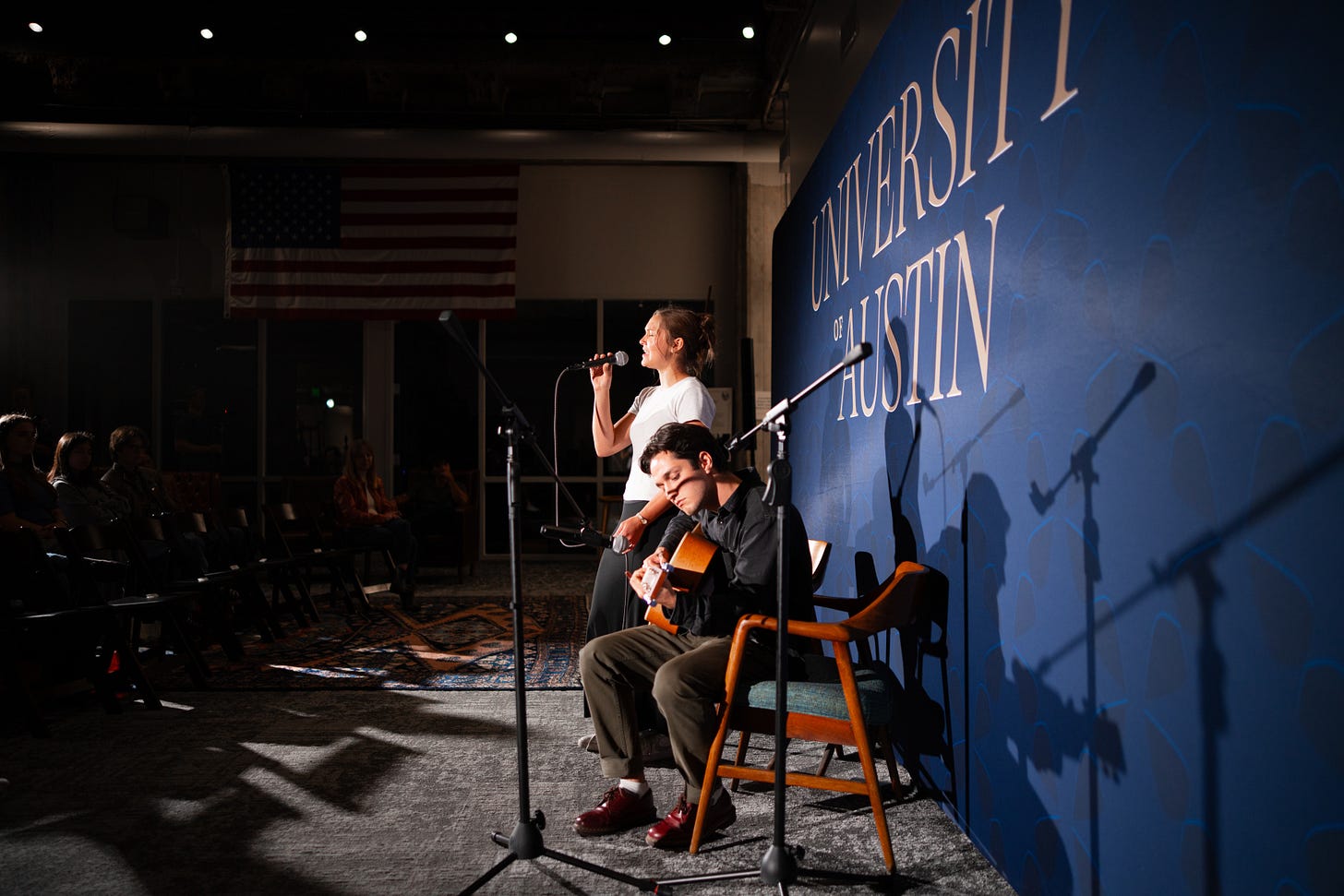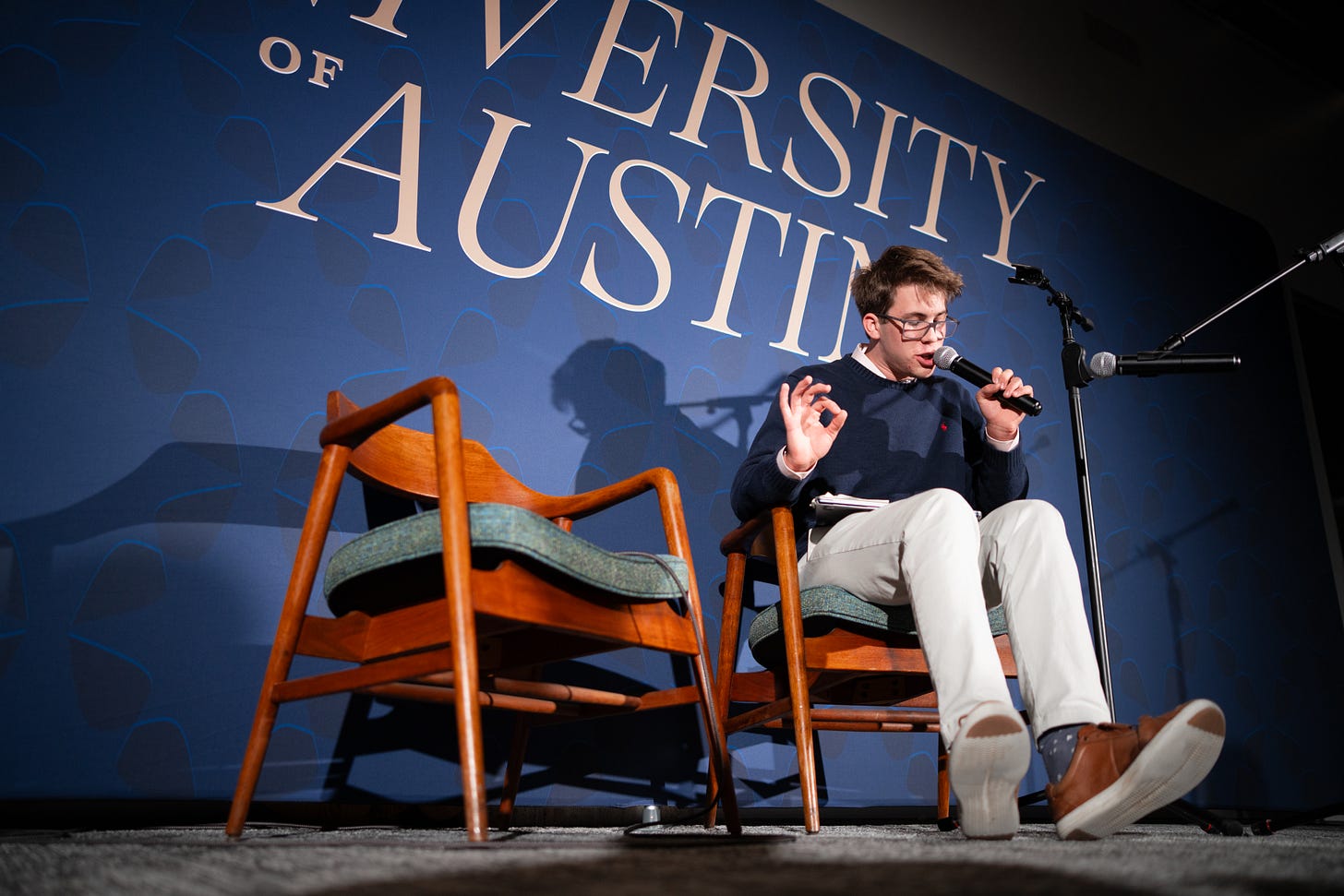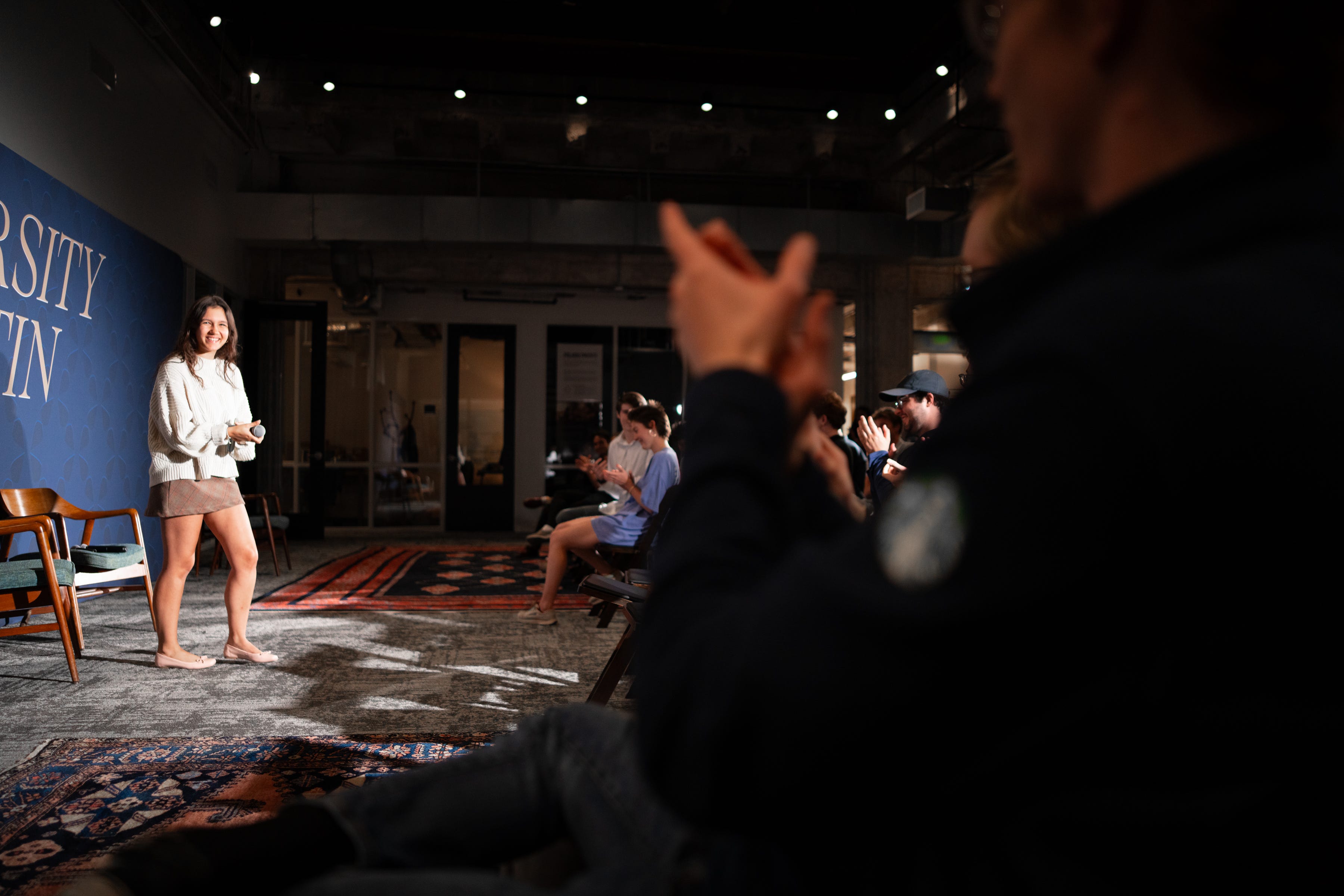How We Aspire to Distinction
Students organize the first UATX talent show. Plus: Read Professor Hoffpauir on how Benjamin Franklin made ambition a virtue.
“There’s something different here,” a visitor to UATX told me recently. “The students are awake. They have light in their eyes.”
I can’t say for sure what animates them, but I have some ideas. Our community is collegial and grounded in shared experience: students live together in a common residence hall, commute to campus using shared transportation, and take the same foundational courses. Studying the great thinkers together – from Plato and Aristotle to Confucius and Karl Popper – provides a rich, common intellectual heritage, breaking down individual silos and igniting a collective adventure. The conversations are rich and never-ending. The jokes take off. The ebullience is palpable.
Yet there’s more. Here, the faculty and staff treat each University of Austin student as an individual capable of, and responsible for, great things. And the faculty and staff expect the same of ourselves. We all strive for excellence, albeit imperfectly.
We have cultivated this learning culture because we believe greatness is within reach. In a society fragmented by relativism, UATX stands apart. We believe we can grow in understanding what will make us happy, virtuous, and good. And to achieve this ideal, we examine the sources of wisdom from the past.
As our President Pano Kanelos said:
Whether our students become engineers, computer scientists, politicians, or poets, they’ll have the grounding to discern right from wrong and better from worse. All UATX students study literature, philosophy, art, mathematics, and the sciences to gain a holistic understanding of human knowledge and wisdom.
Furthermore, we believe that striving to be the best improves each other and the community to which we belong.
No wonder our students look alive.
Last week, our freshmen organized and hosted the first University of Austin talent show. The event included two musical acts, stand-up comedy, a dramatic monologue, and a caricature-drawing demonstration.
When brother-and-sister act Yale and India won first place for their moving rendition of the classic Joni Mitchell hit “River,” spirits were high. The students’ support for their peers’ achievement epitomized the culture of excellence I see on campus every day.
Reading Benjamin Franklin on Vanity and Virtue
In his recent Substack essay, “In Praise of Vanity,” Assistant Professor of Political Theory J. Michael Hoffpauir illuminates Benjamin Frankman’s rethinking of ambition as a virtue rather than a vice.
Hoffpauir guides students through key Enlightenment thinkers to explore how Franklin’s ideas may shape their professional and personal paths:
“In Polaris Ideas, the first course in the Polaris Project academic sequence at the University of Austin, students study the origin of ideas and the moral, social, and economic preconditions for successful innovation. Students read The Discourse on the Sciences and Arts, where its author, Jean-Jacques Rousseau, argues the progress of the sciences and arts necessarily produces a decline in a people’s moral health. If Rousseau is correct, the students wonder, then how can their own desire to bring about progress in science be good? How can the desire to help others through technological advancement materialize in a morally upright manner? And how can their ambition to do great things and desire for fame ever coincide with morality?
“This marks the turn to The Autobiography of Benjamin Franklin and the consideration of whether Rousseau’s argument holds true for this man on these shores. Benjamin Franklin shows how ambition, vanity, public spiritedness, scientific innovation, and the industrious life can be compatible with virtue. In particular, he vindicates vanity. Vanity, the desire for distinction above others, can bring about one’s own good and the good of others.
“Franklin offers his Autobiography to his posterity who might like to know ‘the conducing means [he] made use of’ to attain his affluence and reputation in the world, might find some of these means fitting to their own situations, and might find these means worthy of imitation (43).1 And the Autobiography is also a guide to future generations, including those interested in morality, leadership, and scientific progress.
“Franklin admits he, like most older people, indulges his inclination to talk of himself and his past actions in writing his Autobiography. But he then confesses something far more scandalous:
And lastly, (I may as well confess it, since my Denial of it will be believ’d by no body) perhaps I shall a good deal gratify my own Vanity. Indeed I scarce ever heard or saw the introductory Words, Without Vanity I may say, &c. but some vain thing immediately follow’d. Most People dislike Vanity in others whatever Share they have of it themselves, but I give it fair Quarter wherever I meet with it, being persuaded that it is often productive of Good to the Possessor and to others that are within his Sphere of Action: And therefore in many Cases it would not be quite absurd if a Man were to thank God for his Vanity among the other Comforts of Life (44).
“How could ‘The First American’ confess something so undemocratic?2 How could he confess his vanity—his ambition for distinction above others—to us all? This is no faux pas. This vain man is here to help, and he is armed with a hard-nosed realism. Most people despise the vanity of others, yes, and most people are themselves vain. After all, vanity is not merely my desire to stand above you, but it is also my resentment of those who think they ought to be, or are, placed higher than I. Franklin’s democratic character, then, is evident in his realism regarding human beings’ natural desires and his readiness to give them fair quarter where he meets them.
…
“Decades after Franklin, Alexis de Tocqueville, in his great work, Democracy in America, witnessed ‘self-interest rightly understood’ as the dominant moral doctrine among Americans. It is in one’s self-interest to labor for the common good, observed Tocqueville, and this is a doctrine that Franklin knew, practiced, and espoused in his Autobiography. Self-interest rightly understood is vanity well used. Praise vanity for producing a spirit of innovation and leadership that are “productive of Good to the Possessor and to others that are within his Sphere of Action” (44). Praise vanity for showing how, in America, scientific progress is compatible with morality.”
Aspiring to Join the Class of ‘29?
At the University of Austin, we strive to build and sustain a community of excellence based on the lively clash of ideas.
APPLY NOW to join the Class of 2029.
Each student in the Class of 2029 will be awarded a Founders Scholarship covering the full cost of undergraduate tuition for four years, subject to terms and conditions.
That’s a value of approximately $130,000.
Schedule a campus visit to sit in on classes, meet the Admissions team, and experience what the fearless pursuit of truth looks like in action.
Join Us for Forbidden Courses
The Office of Admissions invites prospective students to the latest installment of Forbidden Courses, that vintage UATX program through which we brought our academic offerings to students before we recruited our founding freshman class.
On college campuses nationwide, genuine conversations are becoming an endangered species. The simple practice of asking questions honestly and without shame for greater clarity and deeper understanding is increasingly relegated to spaces outside the classroom. At UATX, students experience the joy of unabashed inquiry, nourished by a community where diverse perspectives are united in a common endeavor—the fearless pursuit of truth.
High school seniors and current college freshmen are encouraged to apply for our Forbidden Courses program from January 17-20, 2025. Applications are open now until November 30, 2024.
Maggie Kelly is the Communications Manager at the University of Austin.
Franklin, Benjamin. The Autobiography of Benjamin Franklin. Yale University Press, 2003.
See https://www.pbs.org/thinktank/transcript956.html and Brands, H. W. The First American: The Life and Times of Benjamin Franklin. Anchor, 2002.














This is so cool. If I were younger by 20 years, I'd kill to go to UATX.
Enjoyed learning about these activities